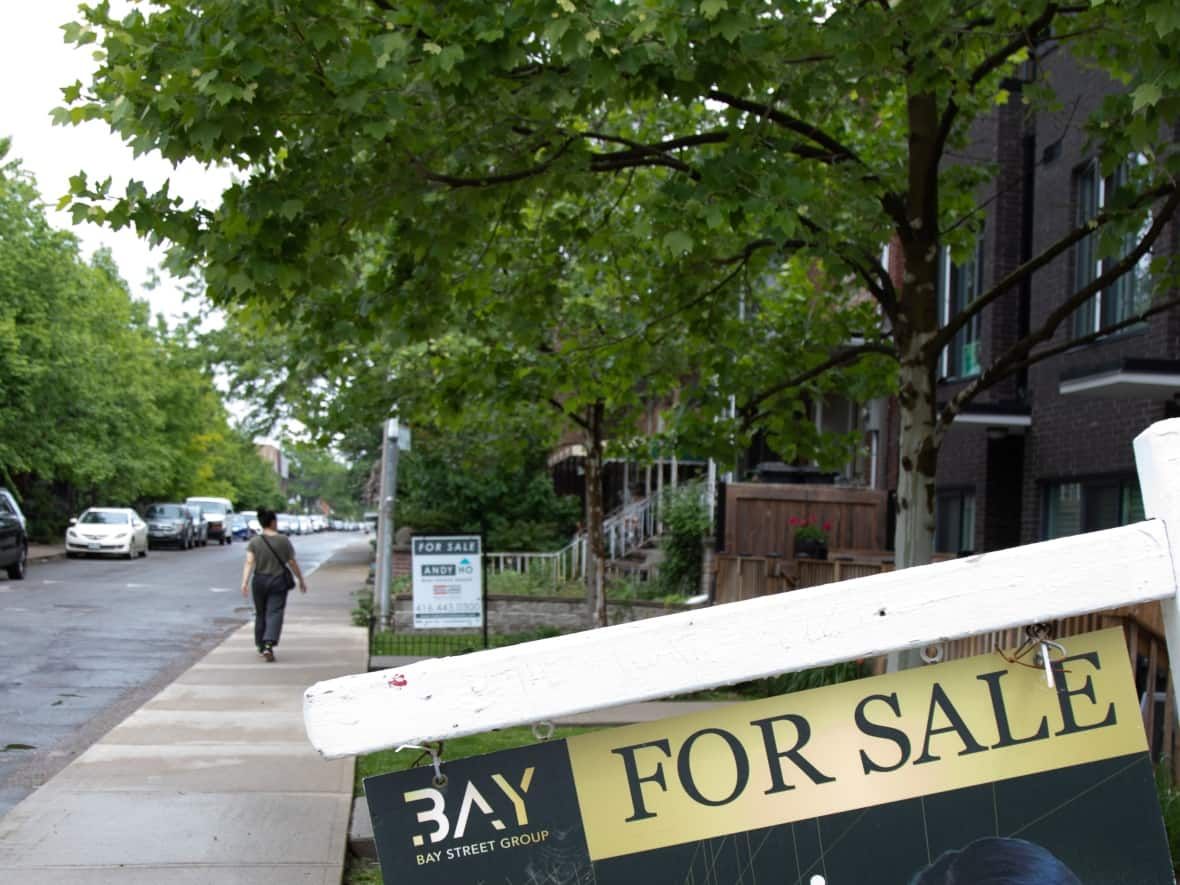Home sales declined by 5.3 per cent in July, back to pre-COVID levels

Canada's housing market continued to cool in July, with the average home price clocking in at $629,971 — a figure that drops by another $104,000 when excluding the Greater Toronto Area and Vancouver markets — as compared to June's average price of $665,850.
The volume of home sales also went down, dropping by 5.3 per cent on a month-over-month basis. This marked the smallest decline in sales since housing activity started slowing five months ago, according to a monthly housing statistics report released by the Canadian Real Estate Association (CREA) on Monday.
The report shows housing activity returning to pre-pandemic levels, and the housing market continuing to stabilize after two pandemic years that set Canadian housing activity ablaze with record-setting sales prices and selling volumes.
That fire was then extinguished when the Bank of Canada hiked interest rates in early 2022, upping mortgage prices and giving buyers less bang for their buck.
The GTA, Greater Vancouver and the Fraser Valley, Calgary and Edmonton led the home sales decline, which occurred in three quarters of all local markets, according to the statement from CREA.
"July saw a continuation of the trends we've been watching unfold for a few months now; sales winding down and prices easing in some relatively more expensive parts of the country as well as places where prices rose most over the past two years," CREA chair Jill Oudil said in the national statistics report.
She added that while strong demand from earlier this year hasn't faded, "some buyers will likely stay on the sidelines until they see what happens with borrowing costs and prices. As they re-enter the market, they'll find a bit more selection, but not as much as might be expected."
The average home price in Canada down more than 18% since February
Newly listed properties also declined by 5.3 per cent — the same figure, incidentally, as the decline in home sales — which indicates that some sellers are "playing the waiting game," according to Shaun Cathcart, CREA's senior economist.
Prices falling but still up year-over-year
Robert Hogue, an assistant chief economist at RBC, told CBC News that the report shows the market is "pretty much in full correction mode."
"But what we're seeing in July is that some of that weakness is also starting to spread across the country, which is what we expected, given that higher interest rates are affecting pretty much every buyer from coast to coast," he said.
"There is relatively more supply relative to where demand is being softer and prices are starting to weaken as well, especially in Ontario."
The MLS house price index, which adjusts the national numbers by volume and type of housing so that Toronto and Vancouver don't affect the overall picture disproportionately, was down 1.7 per cent month-over-month but still up 10.9 per cent year-over-year.
WATCH | Home prices see biggest declines in years:
The CREA's statistics show July prices declines in Ontario and B.C., and a small dip in Quebec, while the Prairies held steady. In Atlantic Canada, Halifax-Darmouth dipped slightly while the rest of the region continued to see prices rising at a slow but steady pace.
Hogue noted that smaller markets, which saw skyrocketing price increases during the pandemic, are now seeing a significant correction: among them are Ontario cities like Cambridge, Brantford and London.
While markets across the country were essentially synchronized during the pandemic, there will be a "diversity of outcomes" across the Canadian housing markets going forward, he said.
The actual national average sale price, without seasonal adjustments, saw a 5 per cent year-over-year decline in July.
Calgary sees influx of buyers from out of town
Calgary is seeing an influx of buyers from out of town, particularly Ontario and B.C., according to Len T. Wong, a Calgary realtor. While Toronto and Vancouver's housing activity shifted significantly during the pandemic, Calgary maintained a relatively stable market as people sought to change their lifestyles.
"What I think a lot of people were doing is that they were taking the money off the table and recognizing Alberta [for its] quality of life," said Wong.

Homes that sell for $600,000 in Calgary or Airdrie, Alta., Wong added, are worth upwards of $1 million in Ontario or B.C. In some cases, sellers are receiving offers of $100,000 over the asking price.
As more rate hikes are expected from the Bank of Canada to cool inflation, it will be harder for prospective buyers to qualify for a mortgage.
'It feels like a dangerous time to buy'
Marshall Smith, a buyer who moved to B.C.'s Kootenay region with his partner over a year ago in pursuit of housing affordability, said he is still looking as prices soften somewhat. While demand is high in smaller towns, the inventory is limited, according to Smith.
"We check every single morning," he said.
Affordable houses in the region are often "really close to falling apart" he said, noting "it's going to cost a lot of money to fix them." Smith said he and his partner are already pushing their budget and living paycheck to paycheck.
Renting is a challenging option in the area, Smith said, due to a lack of rent control and a high turnover rate buoyed by students and seasonal workers. His preference is to spend less on a rate hike in the short-term rather than pay more money in the event of having to remortgage in a few years.
"It's just — it's very unsettling. So it feels like a dangerous time to buy."
WATCH | Ottawa resident says 'disheartening' apartment search has life on hold:

 Yahoo Movies
Yahoo Movies 
